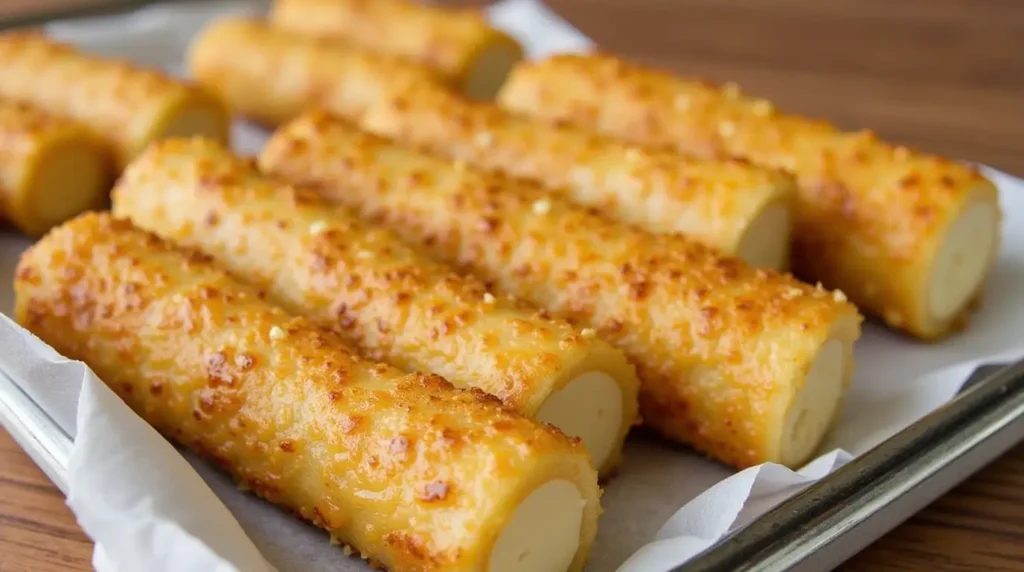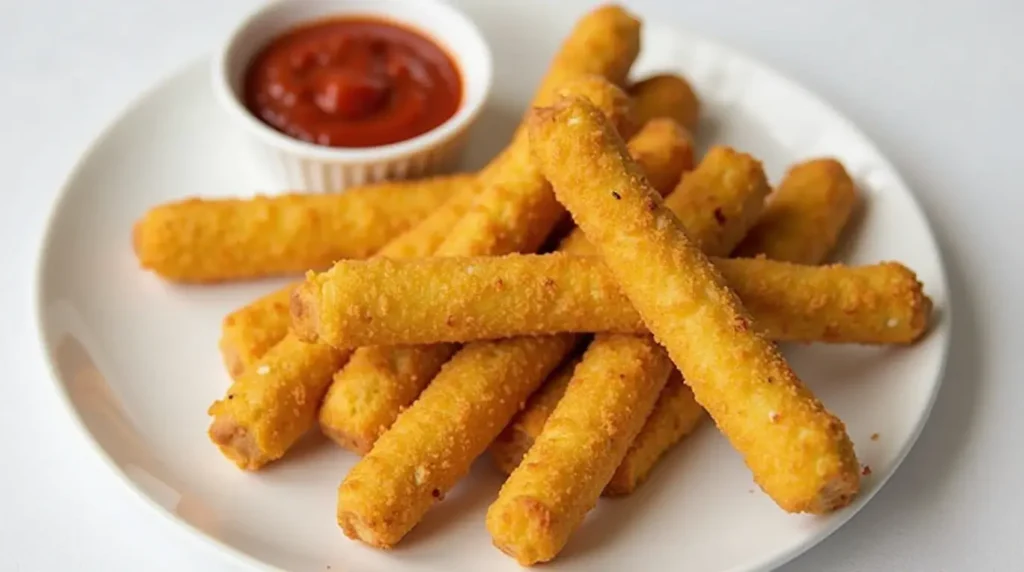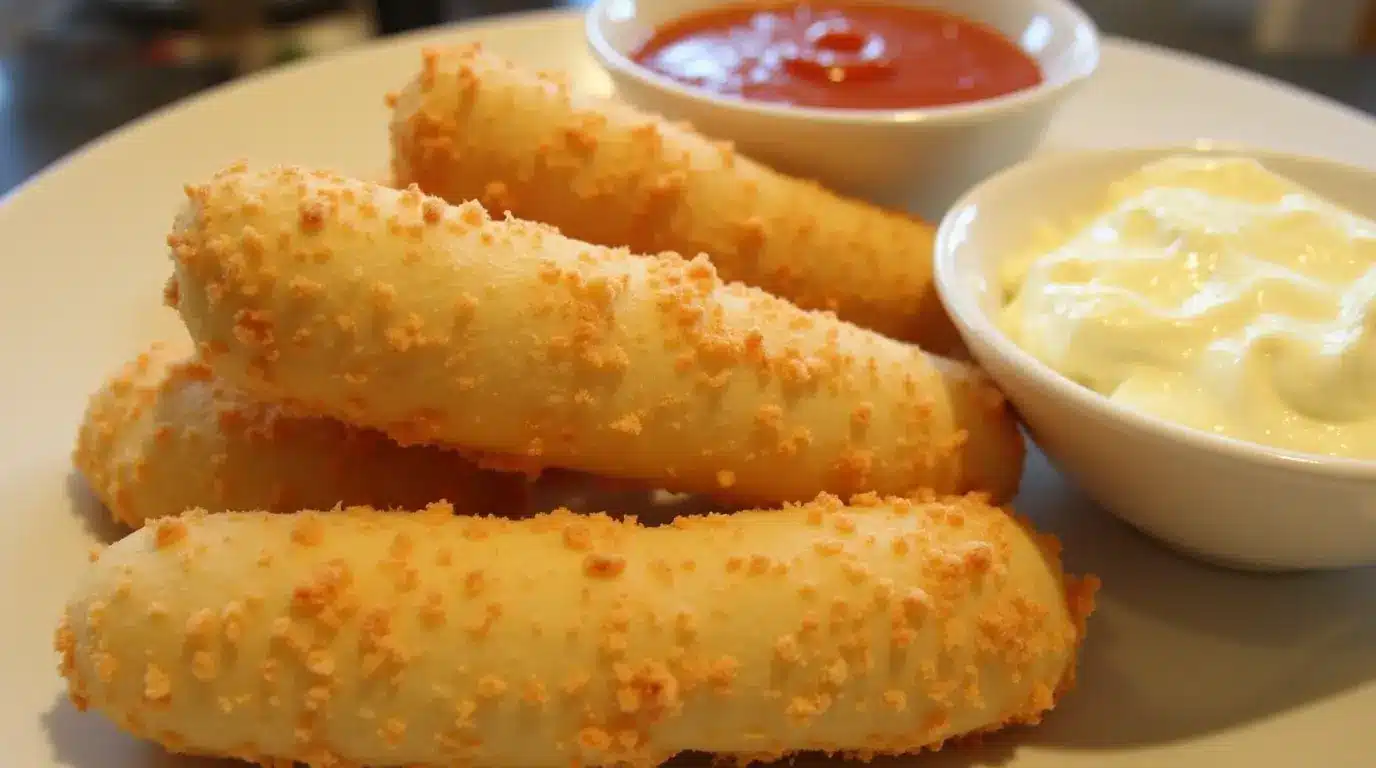Craving cheesy goodness? Discover the surprising mozzarella sticks nutrition facts. This guide dives into calories, carbs, and health aspects. Learn whether these snacks fit your diet!
Mozzarella sticks are a beloved snack enjoyed by many. Their appeal lies in the combination of crispy coating and gooey cheese. For example, they’re often served as appetizers or late-night treats. However, understanding their nutritional content is crucial. After all, mozzarella sticks nutrition can vary significantly. Therefore, this article explores the nutritional aspects of this popular snack.
Comprehensive Mozzarella Sticks Nutrition Breakdown
Understanding mozzarella sticks nutrition involves analyzing various components. For example, calories, fats, carbohydrates, and proteins all play a role. Additionally, micronutrients and sodium content are important. Therefore, let’s break down the mozzarella sticks nutrition facts:
- Calories: A typical serving contains a significant number of calories.
- Fat: Includes both saturated and unsaturated fats.
- Carbohydrates: Mostly from the breading.
- Protein: Derived from the mozzarella cheese.
- Micronutrients: Calcium is a notable nutrient.
- Sodium: Can be high, depending on the preparation.

Amazing Mozzarella Sticks Nutrition Facts: Are They Good For You?
- Total Time: 10 minutes
- Yield: 6 mozzarella sticks 1x
- Diet: Vegetarian
Description
A general nutrition profile for mozzarella sticks, based on a typical serving of fried cheese sticks with breading. Great for a quick snack, appetizer, or party platter.
Ingredients
- 6 mozzarella sticks (frozen or homemade, breaded and fried)
- Optional: marinara sauce for dipping
Instructions
- 1. Cook mozzarella sticks according to package instructions or recipe, typically by baking or deep frying.
- 2. Serve warm with marinara sauce or desired dip.
- 3. Nutrition values may vary slightly based on brand and cooking method.
Notes
For a lighter option, bake instead of deep fry.
Air frying reduces fat content while maintaining crispiness.
Look for low-fat cheese versions to cut calories and saturated fat.
- Prep Time: 0 minutes
- Cook Time: 10 minutes
- Category: Appetizer
- Method: Frying
- Cuisine: American
Nutrition
- Serving Size: 3 sticks
- Calories: 270
- Sugar: 1g
- Sodium: 600mg
- Fat: 17g
- Saturated Fat: 8g
- Unsaturated Fat: 7g
- Trans Fat: 0g
- Carbohydrates: 18g
- Fiber: 1g
- Protein: 12g
- Cholesterol: 35mg
Keywords: mozzarella sticks, fried cheese, appetizer, snack, cheese sticks
Detailed Calorie Count
The calorie count in mozzarella sticks nutrition is a key consideration. A single stick can contain between 70 and 100 calories. Therefore, a serving of 3-5 sticks can quickly add up. Moreover, the calories mainly come from fat and carbohydrates. Consequently, it’s important to factor this into your daily intake.
Macronutrient Composition
Analyzing the macronutrient composition further enhances our understanding of mozzarella sticks nutrition.
- Fat Content: Varies based on the type of cheese and cooking method. For example, fried sticks have a higher fat content.
- Carbohydrates: Primarily from the breading. Furthermore, the type of breading influences the carb count.
- Protein: Contributed by the mozzarella cheese. In addition, protein is essential for muscle repair and growth.
Micronutrient Profile
Regarding micronutrients, mozzarella sticks nutrition provides some benefits. For example, calcium is present, supporting bone health. However, other vitamins and minerals are less significant. Therefore, it’s essential to get these nutrients from other sources.
Sodium Levels
Sodium levels in mozzarella stick nutrition can be a concern. High sodium intake is linked to increased blood pressure. Consequently, monitoring your sodium consumption is vital. Moreover, some brands contain more sodium than others.

Caloric Content: A Closer Look
The caloric content of mozzarella sticks nutrition should not be underestimated. A serving can easily contribute to a significant portion of your daily calorie needs. Therefore, it’s important to understand how many calories you are consuming.
- Calories per stick: Averages around 70-100 calories.
- Comparison to other snacks: Higher than some healthier options.
- Impact on daily intake: This can contribute to weight gain if not balanced.
Therefore, being mindful of portion sizes is crucial.
Fat Content: Understanding the Types
The fat content is a significant part of mozzarella sticks nutrition. It’s crucial to differentiate between types of fats. For example, saturated, unsaturated, and trans fats have different effects on the body. Therefore, understanding these differences is important.
- Saturated Fat: Can raise cholesterol levels.
- Unsaturated Fat: Generally considered healthier.
- Trans Fat: This should be avoided due to health risks.
Therefore, choosing options with lower saturated and trans fats is beneficial.
Carbohydrates and Fiber: What to Expect
Carbohydrates largely come from the breading in mozzarella sticks nutrition. Fiber content, however, is generally low. Therefore, balancing this snack with fiber-rich foods is advisable.
- Carb Content: Primarily simple carbohydrates.
- Fiber Content: Minimal, offering little digestive benefit.
- Impact on Blood Sugar: Can cause spikes due to low fiber.
Therefore, mindful consumption is key.
Protein in Mozzarella Sticks: Benefits and Sources
Protein is a beneficial component of mozzarella sticks nutrition. It comes from the mozzarella cheese. Protein is essential for various bodily functions. Therefore, it’s a valuable part of this snack.
- Protein Content: Supports muscle health.
- Benefits of Protein: Aids in satiety and repair.
- Comparison to other sources: Lower than lean meats or legumes.
Therefore, while it provides protein, it shouldn’t be your primary source.
Micronutrients: Vitamins and Minerals
While mozzarella sticks nutrition isn’t packed with micronutrients, it does offer some benefits. For instance, calcium is a notable nutrient. Calcium is vital for bone health. Therefore, this aspect of mozzarella sticks nutrition is positive.
- Calcium: Supports bone strength.
- Vitamin A: Present in small amounts.
- Other Micronutrients: Limited quantities.
Therefore, rely on a varied diet for comprehensive nutrition.
Sodium Content: A Concern for Health
The sodium content in mozzarella sticks nutrition is a significant concern. High sodium intake can lead to health issues. Therefore, monitoring your sodium levels is crucial.
- Sodium Levels: Often high, depending on the brand.
- Health Risks: Can contribute to high blood pressure.
- Tips for Reduction: Choose low-sodium options.
Therefore, moderation is essential to mitigate these risks.
Mozzarella Sticks Nutrition vs. Other Cheesy Snacks
Comparing mozzarella sticks nutrition to other snacks can provide perspective. For example, consider cheese fries and pizza rolls. Therefore, let’s see how they stack up.
- Cheese Fries: Higher in fat and calories.
- Pizza Rolls: Similar calorie count but more processed.
- Healthier Alternatives: Baked cheese crisps or vegetable sticks.
Therefore, making informed choices is important.

Impact on Weight Management
Understanding the impact of mozzarella sticks nutrition on weight is essential. Regular consumption without moderation can lead to weight gain. Therefore, mindful eating is crucial.
- Role in Weight Gain: High calorie and fat content.
- Portion Control: Key to managing calorie intake.
- Balancing with Diet: Incorporate into a balanced meal plan.
Therefore, moderation and balance are key.
Health Implications of Eating Mozzarella Sticks
The health implications of mozzarella stick nutrition depend on consumption habits. Overeating can lead to cardiovascular issues. Therefore, it’s important to consider the broader impact.
- Cardiovascular Health: High fat content can be detrimental.
- Cholesterol Levels: Saturated fat can raise cholesterol.
- Overall Dietary Balance: Consume in moderation as part of a balanced diet.
Therefore, balance is key to minimizing risks.
Making Healthier Mozzarella Sticks at Home
You can improve mozzarella sticks nutrition by making them at home. Baking instead of frying significantly reduces calories. Therefore, this is a great option.
- Baking vs. Frying: Baking reduces fat content.
- Whole Wheat Breadcrumbs: Adds fiber.
- Low-Fat Cheese: Reduces fat and calories.
- Herbs and Spices: Enhances flavor without added calories.
Therefore, homemade versions can be healthier.
Pairing Mozzarella Sticks with Nutritious Foods
Pairing mozzarella sticks nutrition with healthy foods can balance the meal. For example, vegetable sticks and dips are a great addition. Therefore, consider these pairings.
- Vegetable Sticks: Adds fiber and vitamins.
- Side Salads: Provides essential nutrients.
- Fruit Pairings: Offers vitamins and antioxidants.
Therefore, balanced pairings enhance the overall nutritional value.
Addressing Common Concerns About Mozzarella Sticks Nutrition
Several concerns often arise regarding mozzarella sticks nutrition. Allergies, lactose content, and gluten are common considerations. Therefore, let’s address these concerns.
- Allergies: Dairy and gluten are common allergens.
- Lactose Content: This can be problematic for lactose-intolerant individuals.
- Gluten Considerations: Use gluten-free breading for those with gluten sensitivities.
Therefore, awareness and alternatives are essential.
Mozzarella Sticks for Different Diets
Mozzarella sticks nutrition can be adapted for various diets. For example, those on keto or low-carb diets need to be cautious. Therefore, consider these adaptations.
- Keto Diet: Limit due to carb content.
- Low-Carb Diet: Choose low-carb breading options.
- Vegetarian Diet: Suitable, as they contain no meat.
Therefore, modifications can make them diet-friendly.
The Role of Mozzarella Cheese in Nutrition
Mozzarella cheese itself has nutritional benefits. It’s a good source of calcium and protein. Therefore, this aspect of mozzarella sticks nutrition is positive.
- Benefits of Mozzarella: Provides calcium and protein.
- Calcium and Protein Content: Essential for bone and muscle health.
- Lower Fat Options: Available for healthier choices.
Therefore, mozzarella cheese contributes positively.
Deep Dive into Restaurant Mozzarella Sticks Nutrition
Restaurant mozzarella sticks nutrition often differs significantly. Fast food options tend to be higher in calories and sodium. Therefore, be mindful of these differences.
- Nutritional Differences: Varies between restaurants.
- Fast-Food Options: Often higher in fat and sodium.
- Hidden Ingredients: Additives and preservatives.
Therefore, awareness is crucial when eating out.
Analyzing Specific Brands of Mozzarella Sticks
Different brands vary in their mozzarella sticks nutrition. Some may contain more hidden sugars or sodium. Therefore, scrutinizing ingredient lists is essential.
- Nutritional Comparison: Check labels for fat, sodium, and sugar.
- Hidden Sugars: Some brands add unnecessary sugars.
- Ingredient List: Review for additives and preservatives.
Therefore, brand comparison is advisable.
Tips for Mindful Snacking with Mozzarella Sticks
Mindful snacking can improve your experience with mozzarella sticks nutrition. Portion control and slow eating are key. Therefore, practice these tips.
- Portion Control: Limit serving sizes.
- Eating Slowly: Savor each bite.
- Avoiding Mindless Consumption: Pay attention to hunger cues.
Therefore, mindful habits promote healthier snacking.

The Psychological Aspect of Eating Mozzarella Sticks
Mozzarella sticks can be a comfort food for many. Emotional eating can influence consumption. Therefore, understanding these psychological aspects is important.
- Comfort Food: Associated with positive emotions.
- Emotional Eating: Eating in response to feelings.
- Healthier Coping Mechanisms: Find alternative ways to manage emotions.
Therefore, addressing emotional triggers can help.
Incorporating Mozzarella Sticks Nutrition Into a Balanced Diet
Integrating mozzarella sticks nutrition into a balanced diet requires planning. Balancing high-calorie treats with nutritious meals is essential. Therefore, consider these strategies.
- Planning Meals: Account for snack calories.
- Balancing Treats: Offset with healthy foods.
- Informed Choices: Make conscious decisions.
Therefore, strategic planning is key.
Expert Opinions on Mozzarella Sticks and Health
Experts offer valuable insights on mozzarella sticks nutrition and health. Dietitians and nutritionists emphasize moderation. Therefore, consider their recommendations.
- Dietitian Perspectives: Moderation is key.
- Nutritionist Recommendations: Balance with nutrient-rich foods.
- Balancing Enjoyment: Enjoy in moderation as part of a healthy lifestyle.
Therefore, professional guidance is beneficial.
Latest Research on Cheese and Health
Recent studies explore the role of cheese in a balanced diet. Emerging insights suggest that cheese can be part of a healthy eating pattern. Therefore, stay informed.
- Recent Studies: Dairy can have benefits.
- Role of Cheese: Can provide essential nutrients.
- Emerging Insights: Ongoing research continues to evolve our understanding.
Therefore, staying updated is important.
Debunking Myths About Mozzarella Sticks Nutrition
Several myths surround mozzarella sticks nutrition. Separating fact from fiction is essential for making informed choices. Therefore, let’s debunk some common misconceptions.
- Common Misconceptions: Often perceived as purely unhealthy.
- Fact vs. Fiction: Provide accurate information.
- Accurate Information: Base decisions on facts.
Therefore, clarity is crucial for informed decisions.
Long-Term Effects of Regularly Eating Mozzarella Sticks
Regularly eating mozzarella sticks can have long-term health effects. Potential consequences include weight gain and increased cholesterol. Therefore, moderation is key.
- Potential Consequences: Weight gain and high cholesterol.
- Strategies for Mitigation: Balance with exercise and healthy eating.
- Importance of Moderation: Limit consumption to avoid adverse effects.
Therefore, long-term health requires balance.
Sustainable and Ethical Considerations
Consider sustainable and ethical aspects when enjoying mozzarella sticks nutrition. Sourcing of ingredients and environmental impact are important. Therefore, make responsible choices.
- Sourcing of Ingredients: Choose sustainable options.
- Environmental Impact: Consider the production process.
- Responsible Choices: Support ethical brands.
Therefore, conscious choices benefit the planet.
Creative Ways to Enjoy Mozzarella Sticks
There are creative ways to enjoy mozzarella sticks. Unique recipes and pairings can elevate the snacking experience. Therefore, consider these ideas.
- Unique Recipes: Incorporate into interesting dishes.
- Incorporating into Meals: Add to salads or pasta.
- Elevating Experience: Pair with gourmet sauces.
Therefore, creativity enhances enjoyment.
Mozzarella Sticks Nutrition for Children: Guidelines and Tips
When it comes to mozzarella sticks nutrition for children, guidelines are crucial. Appropriate portion sizes and balancing with other foods are key. Therefore, follow these tips.
- Appropriate Portions: Smaller servings for kids.
- Balancing with Foods: Pair with fruits and vegetables.
- Healthy Choices: Encourage nutritious options.
Therefore, responsible parenting is essential.
Mozzarella Sticks Around the World: Variations and Comparisons
Mozzarella sticks have variations around the world. Regional differences and cultural adaptations exist. Therefore, exploring these contrasts is interesting.
- Regional Differences: Variations in preparation.
- Cultural Adaptations: Unique flavor profiles.
- Nutritional Contrasts: Differences in ingredient sourcing.
Therefore, global perspectives enrich the experience.
Frequently Asked Questions (FAQs)
How many calories are in 1 mozzarella stick?
One mozzarella stick typically contains between 70 and 100 calories, depending on the size and preparation method. The majority of these calories come from fat and carbohydrates.
Are mozzarella sticks healthy?
Mozzarella sticks are not inherently healthy due to their high fat and sodium content. However, they can be enjoyed in moderation as part of a balanced diet if portion sizes are controlled and they are paired with nutritious foods.
How many calories are in 4 mozzarella sticks from Sonic?
Four mozzarella sticks from Sonic contain approximately 320-400 calories. This can vary slightly depending on the specific preparation and any additional sauces or dips.
How many calories are in 6 fried mozzarella sticks?
Six fried mozzarella sticks typically contain between 420 and 600 calories, depending on their size and the amount of oil absorbed during frying. Baking them can significantly reduce the calorie count.
Enjoying Mozzarella Sticks Responsibly
In conclusion, understanding mozzarella sticks nutrition is vital for enjoying them responsibly. Moderation, balance, and informed choices are key. Therefore, incorporate these into your lifestyle. Enjoy these treats mindfully as part of a healthy lifestyle!
Don’t miss our Honeycrisp Apple Calories – The Sweet Low-Cal Treat You’ll Love for another fresh and healthy treat idea when you’re not in the mood for cake!

